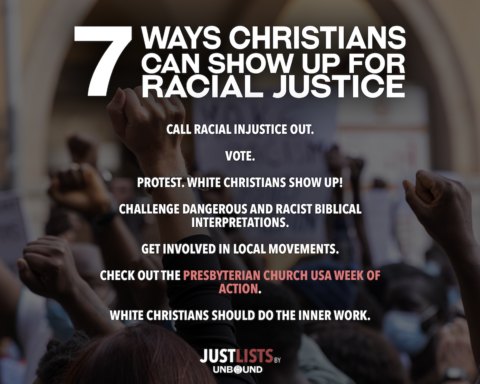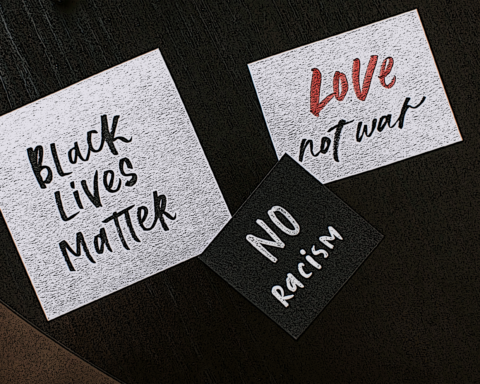When I returned to Agua Prieta in 2017, I attended a bilingual Bible study with the members of the Presbyterian binational ministry, Frontera de Cristo. Frontera de Cristo members often cite the verses of Ephesians 2:13-20:
“For he [Jesus] himself is our peace, who has made the two groups one and has destroyed the barrier, the dividing wall of hostility, by setting aside in his flesh the law with its commands and regulations… For through him we both have access to the Father by one Spirit. Consequently, you are no longer foreigners and strangers, but fellow citizens with God’s people and also members of his household, built on the foundation of the apostles and prophets, with Christ Jesus himself as the chief cornerstone.”
While the legal definition of “citizen” confines people according to their documentation status, the racist legacy of citizenship in the United States tells us that this system is deeply flawed. Jesus presents a new vision of citizenship modeled in his own being, his own flesh. While Ephesians speaks to the division within a multicultural (Jewish and Hellenistic) church community, this text takes new meaning when interpreted from the border wall and the streets of South Nashville.
Who is my neighbor? When a legal expert asked Jesus this question, Jesus responds with the story that uplifts an ethnic and religious other: the Good Samaritan. Through his storytelling of an act of radical care, Jesus centers an outsider as the “true neighbor” who shows mercy. Jesus’ story breaks the wall of hostility and makes it known that we are all “fellow citizens with God’s people” with a birthright to joy, opportunity, and dignity. Today, Jesus would see the Samaritan in the people standing in la linea who care for each other’s children. The Samaritan is the volunteer who serves home cooked meals to the guests at CAME. The Samaritan is the advocate speaking up for more humane and faithful immigration policies to care for our neighbors.
Today, we also see our neighbors being attacked by robbers: the Kurdish Muslim business owner who faces rising rent prices, the Latino migrant farmworker whose wages are stolen or the Black teacher who is underpaid and searching for housing. Our neighbors are the people who wait in la línea on a razor’s edge of hope and fear. Our neighbors are the people who are denied entry into the United States who are denied mortgage loans, and yet are citizens in God’s household. Our neighbors are the people who travel far distances each morning and night to build new apartment complexes made of shipping containers, the same material being used to keep migrants shut out from America’s borders.
Gentrification and the immigration crisis are deeply connected by the logic of colonialism: from the nation’s founding, white settlers have extorted, stolen, and commodified land, peoples’ bodies, and labor for the sake of profit and plundered gain often in the name of Christianity. Today, the border is being (re)colonized with the blessing of white Christianities. The impact of the US border industrial complex threatens to colonize the globe in an era of massive climate-driven migration.
The border wall runs through Nashville. My home in Nashville is located on occupied Cherokee and Shawnee land. Colonization continues as the gentrification of neighborhoods expels residents of color for white homeowners. The homes being built by immigrant labor have created an industrial city that is unlivable for too many workers. As a Christian, I want to live in a city and nation where all people can thrive, where all people are recognized not as strangers or foreigners but neighbors, where all people share the right of belonging to a neighborhood built around the cornerstone of compassion and justice.
The colonization of the border and Nashville opposes the hospitality of the gospel. In Agua Prieta, Sister Ana fed a group of strangers in her two-room concrete home and welcomed us to eat with her family. Without regard to social status or a shared language, like the Good Samaritan, Sister Ana ushered us into a new way of relating with one another. As Letty Russell argues in Just Hospitality, hospitality transforms us as guests and hosts to relate with reciprocity. To be neighborly, we are called to practice hospitality and break down dividing walls of privilege and injustice.
If we are no longer strangers or foreigners, but fellow members of God’s household, then how am I called to act as a neighbor? How will God treat me as a gentrifier when I am called to account for my actions (Matthew 25:35-40)? Before I make a call for “unity” or “inclusion” in the church or our neighborhoods, I am called to confess the ways that I have lived in Caesar’s house: the house that grows wealth and value on the backs of other people’s stolen land and wages. I have benefited from an exclusive system of citizenship: when I applied for my mortgage, the lenders never doubted that I had papers because of my white skin. I will never face the discrimination of redlining. I will likely never experience wage theft from being paid under the table. This privilege is unearned and can only be rightly used to tear down the walls of exclusion in our housing and immigration systems.
Following confession, there is a need to go beyond welcoming into becoming an accomplice for justice. Belonging to God’s household comes with the cost of seeing, hearing, looking, feeling, imagining, and acting with our neighbors for inclusive development and just immigration policies. To build the kind of neighborhood and nation that resembles the kinship of God, the people waiting in la línea must lead the way first. The shipping containers must carry the harvest of resources and opportunities that the majority, not the few, will reap.
In God’s household, there will be no more evictions. In God’s kindom, we will belong to a shared nation while preserving our cultural differences. We will become neighbors, no longer colonizers and colonized; we will be citizens of a shared patria with room for all.
Elizabeth Welliver is a writer, social activist and graduate student at Vanderbilt Divinity School. Elizabeth is an alumna of the Young Adult Volunteer program and a member of the Presbyterian Peace Fellowship Activist Council. She most enjoys going for walks on Nashville greenways and learning from our collective stories.






Unbound Social